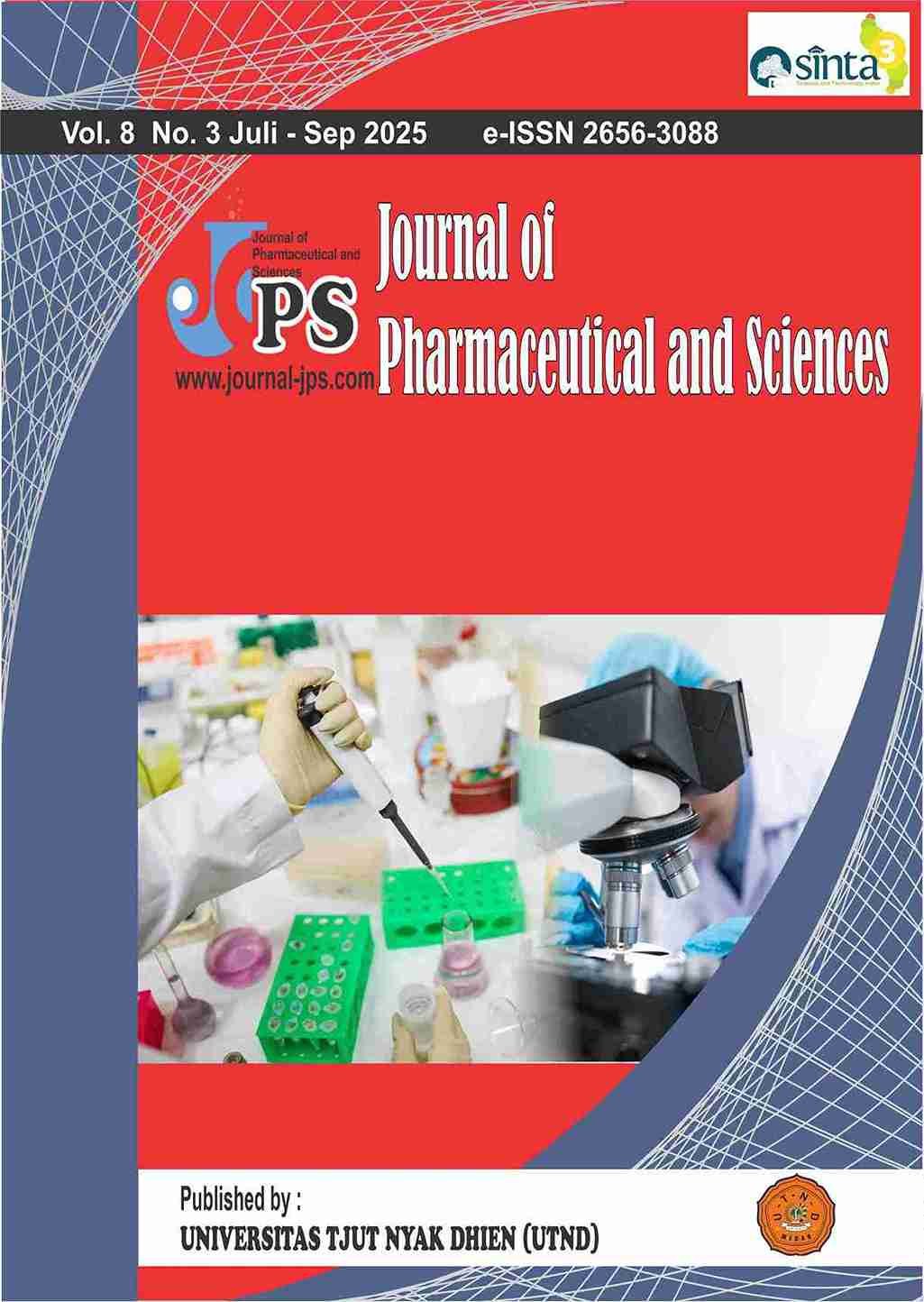Artikel review: Aktivitas Farmakologi Dan Potensi Bioaktif Daun Sirih Cina (Peperomia pellucida L.(Kunth.))
Main Article Content
Page: 2088-2097
Abstract
Background: Peperomia pellucida L. Kunth (sirih cina) is a traditional medicinal plant used to treat various ailments. Its broad pharmacological potential needs to be consolidated from various publications to provide a comprehensive overview. Objective: This review aims to analyze and synthesize recent scientific evidence on the pharmacological activities, bioactive compounds, and potential applications of Pperomia pellucida. Methods: This systematic review was conducted by searching electronic databases (Google Scholar, PubMed, ScienceDirect, Scopus) using relevant keywords. From the search results, 21 original research articles published between 2015-2025 that met the inclusion criteria were analyzed descriptively and qualitatively. Results: The analysis revealed that Peperomia pellucida possesses diverse pharmacological activities, including anti-inflammatory, antibacterial, antifungal, antioxidant, anticancer, antidiabetic, antihypercholesterolemic, and osteogenic effects. These activities are supported by bioactive compounds such as flavonoids, tannins, alkaloids, and saponins. Its ethanolic extract has proven effective in in vitro and in vivo tests, including in topical formulations like creams and acne serums. Preliminary safety profiles indicate non-toxic properties. Conclusion: Peperomia pellucida shows great potential as a natural raw material for developing herbal medicines and cosmetics. Further research, such as human clinical trials and the development of technology-based formulations, is necessary to ensure its long-term safety and efficacy.
Downloads
Article Details

This work is licensed under a Creative Commons Attribution-NonCommercial-ShareAlike 4.0 International License.
References
Putri CA, Ayu Kartika IGA, Adnyana IK. Preventive effect of Peperomia pellucida (L.) Kunth herbs on ovariectomy-induced osteoporotic rats. Journal of Chinese Pharmaceutical Sciences 2016;25:546–51. https://doi.org/10.5246/jcps.2016.07.060.
Razoki, Lister INE, Mutia MS. ARTIKEL REVIEW: AKTIVITAS DAN EFEK FARMAKOLOGI DAUN SIRIH CINA (Peperomia pellucida L.(Kunth.)) 2025.
Lu YC, Yang TYA. Taxonomy of peperomia (Piperaceae) in Taiwan. Taiwania 2020;65:500–16. https://doi.org/10.6165/tai.2020.65.500.
Waty DR, Saputri FC, Mun’im A. Secondary Metabolites Screening and Acute Toxicity Test of Peperomia pellucida(L.) Kunth Methanolic Extracts. Int J Pharmtech Res 2017;10:31–8. https://doi.org/10.20902/ijptr.2017.1014. DOI: https://doi.org/10.20902/IJPTR.2017.1014
Yuliani D, Dewi IK, Marhamah S. Efektivitas Ekstrak Daun Sirih Cina (Peperomia Pellucida) Terhadap Pertumbuhan Bakteri Propionibacterium Acnes dan Tinjauannya Menurut Pandangan Islam. Jurnal Sosial Dan Sains 2022;2:173–81. DOI: https://doi.org/10.59188/jurnalsosains.v2i1.333
Rahma Almira N, Ahidin D, Indawati I. Phytochemical Screening and Antioxidant Activity Test of Ethyl Acetate Fraction Of Chinese Betle Leaves (Peperomia pellucida L.). Medical Sains : Jurnal Ilmiah Kefarmasian 2023;8:1067–78. DOI: https://doi.org/10.37874/ms.v8i3.823
Ahmad I, Hikmawan BD, Sulistiarini R, Mun’im A. Peperomia pellucida (L.) Kunth herbs: A comprehensive review on phytochemical, pharmacological, extraction engineering development, and economic promising perspectives. J Appl Pharm Sci 2023;13:1–9. https://doi.org/10.7324/JAPS.2023.130201. DOI: https://doi.org/10.7324/JAPS.2023.130201
Bialangi N. POTENSI HERBA Peperomia pellucida L.Kunth Sebagai Anti Malaria. vol. I. 1st ed. Gorontalo: Ideas Publishing; 2017.
Harahap DPN, Manullang S, Meyliana D, Chosya C, Aisyah P. Pemanfaatan Daun Sirih Cina (Peperomia pellucida) Sebagai Bahan Alami Pembuatan Serum Anti Jerawat. Communnity Development Journal 2023;4:8942–6.
Endriyatno NC, Puspitasari DN. Formulasi Krim Ekstrak Daun Sirih Cina (Peperomia pellucida L.) Dengan Variasi Konsentrasi Trietanolamin dan Asam Stearat. FORTE JOURNAL 2023;3:33–42. DOI: https://doi.org/10.51771/fj.v3i1.416
Teodhora, Hendriani R, Sumiwi SA, Levita J. Peperomia Pellucida (L.) Kunth: A Decade of Ethnopharmacological, Phytochemical, and Pharmacological Insights (2014–2025). J Exp Pharmacol 2025;17:417–54. https://doi.org/10.2147/JEP.S532898.
Kartika IGAA, Sinarsih NK, Nayaka NMDMW. Anti-Inflammatory Activities of Peperomia pellucida (L.) Kunth.: A Review. Journal of Pharmaceutical Science and Application 2022;4:39–44. https://doi.org/10.24843/jpsa.2022.v04.i01.p06. DOI: https://doi.org/10.24843/JPSA.2022.v04.i01.p06
Mazroatul C, Deni GD, Habibi NA, Saputri GF. Anti-Hypercholesterolemia Activity of Ethanol Extract Peperomia pellucid. ALCHEMY Jurnal Penelitian Kimia 2016;12:88–94. https://doi.org/10.20961/alchemy.v12i1.948. DOI: https://doi.org/10.20961/alchemy.12.1.948.88-94
Widayanti NP, LaksmitaW. AS, Apriyanthi DPRV, Widnyani NM. Antifungal Activityof Chinese Belt Herb (Peperomia pellucida L. Kunth) Ethanol Extract On The Growth Of Candida albicans. Indonesian Journal of Global Health Research 2024;6:1849–58.
Nasution DLI, Tjahajawati S, Indriyanti R, Amaliya A, Fadilah RPN, Mutiara R. Antibacterial test of Peperomia pellucida (L.) Kunth extract against Porphyromonas Gingivalis as a potential herb for periodontitis: a laboratory experiment. Padjadjaran Journal of Dentistry 2023;35:181. https://doi.org/10.24198/pjd.vol35no3.47856. DOI: https://doi.org/10.24198/pjd.vol35no3.47856
Ngueguim FT, Khan MP, Donfack JH, Tewari D, Dimo T, Kamtchouing P, et al. Ethanol extract of Peperomia pellucida (Piperaceae) promotes fracture healing by an anabolic effect on osteoblasts. J Ethnopharmacol 2013;148:62–8. https://doi.org/10.1016/j.jep.2013.03.063Get. DOI: https://doi.org/10.1016/j.jep.2013.03.063
Yunarto N, Ar Rossyid HM, Lienggonegoro LA. Effect of Ethanolic Leaves Extract of Peperomia pellucida (L) Kunth as Antimalarial and Antioxidant. Media Penelitian Dan Pengembangan Kesehatan 2018;28:123–30. https://doi.org/10.22435/mpk.v28i2.132. DOI: https://doi.org/10.22435/mpk.v28i2.132
Ningrum TS, Purba R, Pasaribu SP. Mini Review: Perbandingan Aktivitas Antioksidan Beberapa Spesies Daun Sirih (Piper sp.) dan Potensinya Sebagai Tabir Surya. Jurusan Kimia FMIPA UNMUL, Prosiding Seminar Nasional Kimia; 2024, p. 235–8.
Pratiwi A, Datau WA, Alamri Y, Kandowangko NY. Peluang Pemanfaatan Tumbuhan Peperomia Pellucida (L.) Kunth Sebagai Teh Herbal Antidiabetes. Jambura Journal of Health Science and Research 2021;3:85. DOI: https://doi.org/10.35971/jjhsr.v3i1.7593
Winarno EK, Susanto S, Winarno H. Gamma Irradiation for Preservation of Suruhan Herbs (Peperomia pellucida L. Kunth.) and its Bioactivity Against L1210 Leukemia Cells. JKPK (Jurnal Kimia Dan Pendidikan Kimia) 2020;5:236–44. https://doi.org/10.20961/jkpk.v5i3.46133. DOI: https://doi.org/10.20961/jkpk.v5i3.46133
Majumder P, Abraham P, Satya V. Ethno-medicinal, phytochemical and pharmacological review of an amazing medicinal herb Peperomia pellucida (L.) HBK. Research Journal of Pharmaceutical, Biological and Chemical Sciences 2011;2:358–64.
Fitrya F, Elfita E, Kurniawaty NF, Ahsan AN, Amriani A, Agustiarini V, et al. Hepatoprotective Effect of Ethanol Extract of Chinese Betel Herb (Peperomia pellucida (L.)) On CCl4-Induced Hepatotoxicity in Experimental Animals. Tropical Journal of Natural Product Research 2025;9:3092–6. https://doi.org/10.26538/tjnpr/v9i7.21. DOI: https://doi.org/10.26538/tjnpr/v9i7.21
Hendriani R, Sumiwi SA, Levita J. Peperomia Pellucida (L.) Kunth: A Decade of Ethnopharmacological, Phytochemical, and Pharmacological Insights (2014–2025). Journal of Experimental Pharmacology 2025;17:417–54. https://doi.org/10.2147/JEP.S532898. DOI: https://doi.org/10.2147/JEP.S532898
Ho KL, Yong PH, Wang CW, Kuppusamy UR, Ngo CT, Massawe F, et al. Peperomia pellucida (L.) Kunth and eye diseases: A review on phytochemistry, pharmacology and toxicology. Journal of Integrative Medicine 2022;20:292–304. https://doi.org/10.1016/j.joim.2022.02.002. DOI: https://doi.org/10.1016/j.joim.2022.02.002





